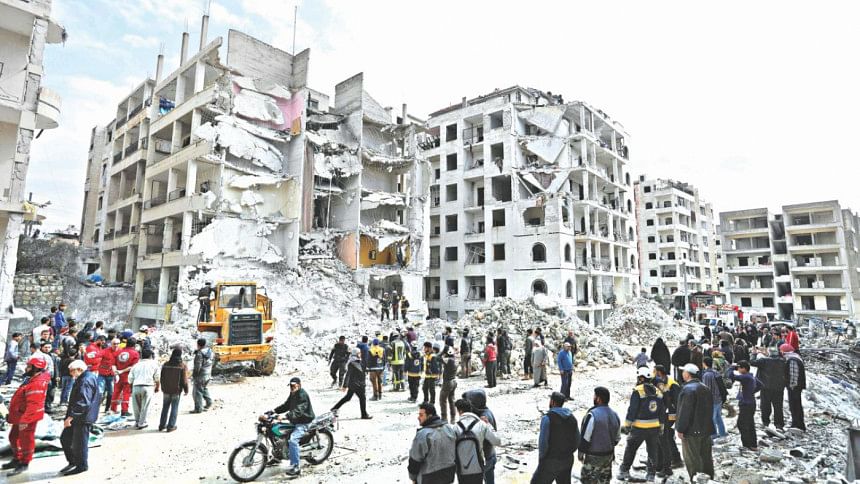Syria on high alert

Syria's regime was bracing for Western action yesterday after US President Donald Trump vowed to respond quickly and forcefully to an alleged chemical attack that has sparked international outrage.
The US, France, and Britain have ramped up pressure on Syria's government by pledging strong reactions to alleged toxic gas use against Douma, the last town still held by rebels in their onetime bastion Eastern Ghouta.
Meanwhile, Russia yesterday vetoed a US-drafted UN Security Council resolution that would have created a new inquiry to ascertain blame for chemical weapons attacks in Syria, reports Reuters.
Twelve council members voted in favour, while Bolivia joined Russia in voting no, and China abstained. A resolution needs nine votes in favour and no vetoes by Russia, China, France, Britain or the United States to pass.
"This resolution is the bare minimum that the council can do to respond to the attack," US Ambassador to the UN Nikki Haley told the council before the vote, referring to reports of a deadly poison gas attack in Douma.
Adding to the tensions, Trump abruptly cancelled his first trip to Latin America yesterday, as he faces momentous decisions about military strikes in Syria.
In a statement that surprised even some White House staff, press secretary Sarah Sanders said Trump's trip to Peru and Colombia -- set to get under way Friday -- had been scrapped.
Meanwhile, the Organisation for the Prohibition of Chemical Weapons, the global chemical weapons watchdog, has said it will send a fact-finding team to the site in Douma. Medical sources said dozens were killed in the alleged attack there, but exact numbers are impossible to verify.
In another development, OPCW said a team would deploy to Syria "shortly". It comes after Syria and its military backer, Russia, both said they wanted to facilitate a visit by inspectors.
Syrian regime forces have categorically denied accusations of using toxic gas including sarin and chlorine in the country's brutal seven-year war.
France warned it would retaliate against Syrian President Bashar al-Assad if evidence emerges that the "red line" of chemical weapons had been crossed in Douma.
And in a phone call, Trump and UK Prime Minister Theresa May vowed "not to allow the use of chemical weapons to continue" in Syria, drawing a red line ahead of possible military action.
Turkish President Recep Tayyip Erdogan said those behind the attacks would "pay a heavy price," after rebel-backer Ankara had said it suspected Assad was responsible.
In Damascus, government forces were on high alert in anticipation of a potential Western military strike, according to a war monitor.
"At midnight, the army command put all military positions on alert, including airports and all bases, for a period of 72 hours," the Syrian Observatory for Human Rights said yesterday.
Units were reinforcing positions and preparing themselves for rapid deployment, but troops had not been transferred or withdrawn, according to the Britain-based monitor, which relies on sources in Syria for its information.
On Monday, Syria's UN ambassador Bashar al-Jaafari accused Western powers of staging such attacks to justify military action against Damascus.
Jaafari said Washington, Paris, and others were falsely accusing his government of chemical use "in order to pave the way for an attack on Syria like the US and Britain's criminal aggression against Iraq in 2003."
Russia's ambassador Vassily Nebenzia said: "From what we hear now, I am afraid they are looking for a military option, which is very, very dangerous."
China also warned against military action in Syria.
At a regular press briefing in Beijing yesterday, Chinese foreign ministry spokesman Geng Shuang said his country was "opposed to the wanton use of force or threat of force".
First responders in Douma say more than 40 people died on Saturday after the suspected poison gas attack, which left people wheezing, with discoloured skin, and foaming at the mouth.
Douma has faced weeks of regime bombardment and is cut off by the regime, making it extremely difficult for journalists to independently verify the claims.
Moscow, which has backed the Syrian regime's assault on Eastern Ghouta, has said its own investigators already entered Douma and found no trace of chemical use.
"Fabrications and false stories are being used to find some pretext for the use of military force," deputy foreign minister Mikhail Bogdanov said.
On Monday, US Ambassador Nikki Haley said the "world must see justice done", while Trump warned the perpetrators there would be a "big price to pay."
Trump on Monday met both his cabinet and top generals, saying the US had "a lot of options militarily" and would decide in the coming days.
US Defense Secretary Jim Mattis has also cancelled weekend travel plans, a US official said yesterday, as the Pentagon works with the White House on a possible Syria response.
In April last year, after a Sarin nerve agent attack killed more than 80 people in a Syrian opposition-held town, Trump ordered the firing of dozens of cruise missiles at a Syrian government air base from US Navy ships in the Mediterranean.
It was the first direct US military action against forces commanded by Syrian President Bashar al-Assad.
Syria's conflict erupted with anti-Assad protests in 2011 but has since evolved into a complex war that has killed 350,000 people.

 For all latest news, follow The Daily Star's Google News channel.
For all latest news, follow The Daily Star's Google News channel. 



Comments